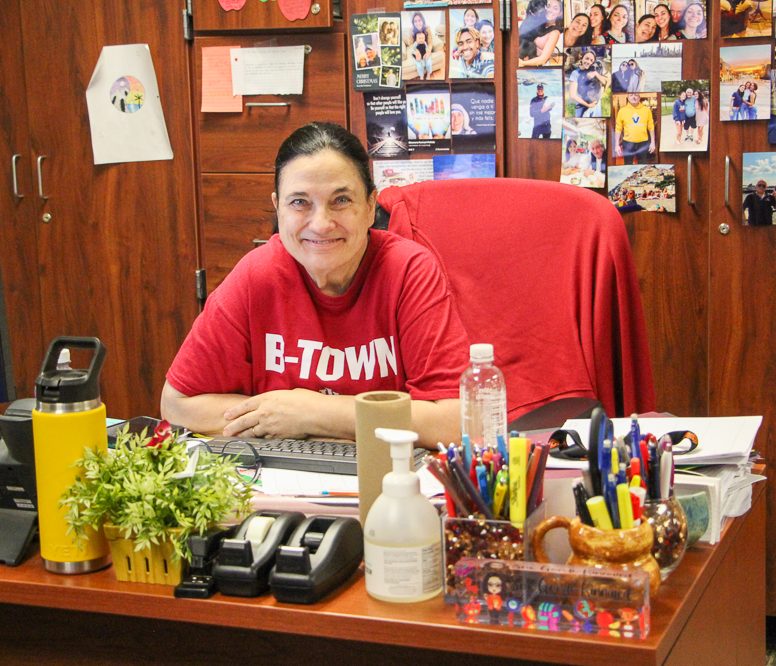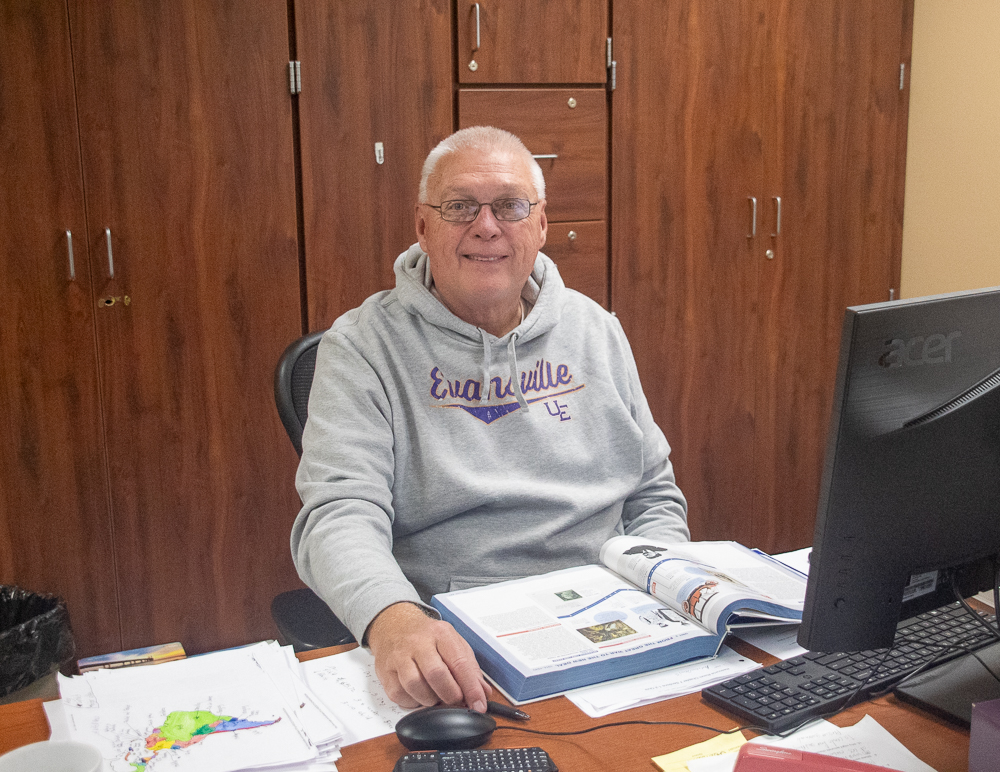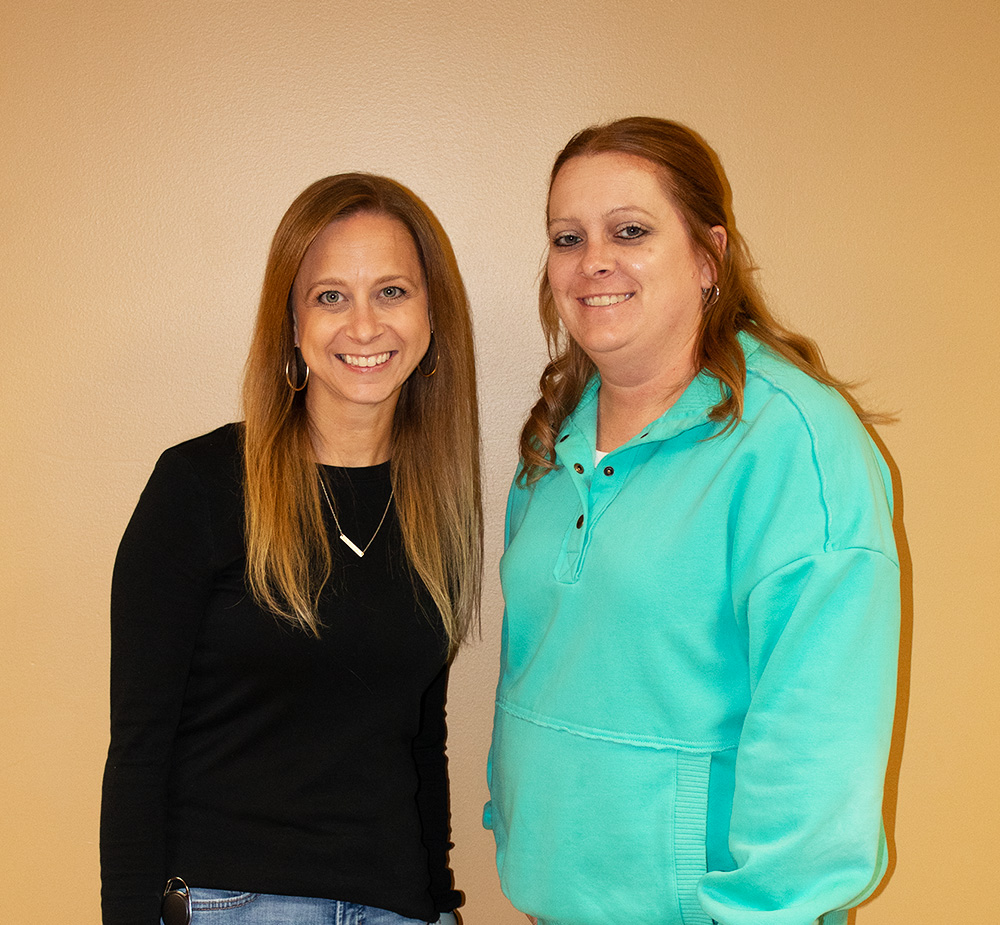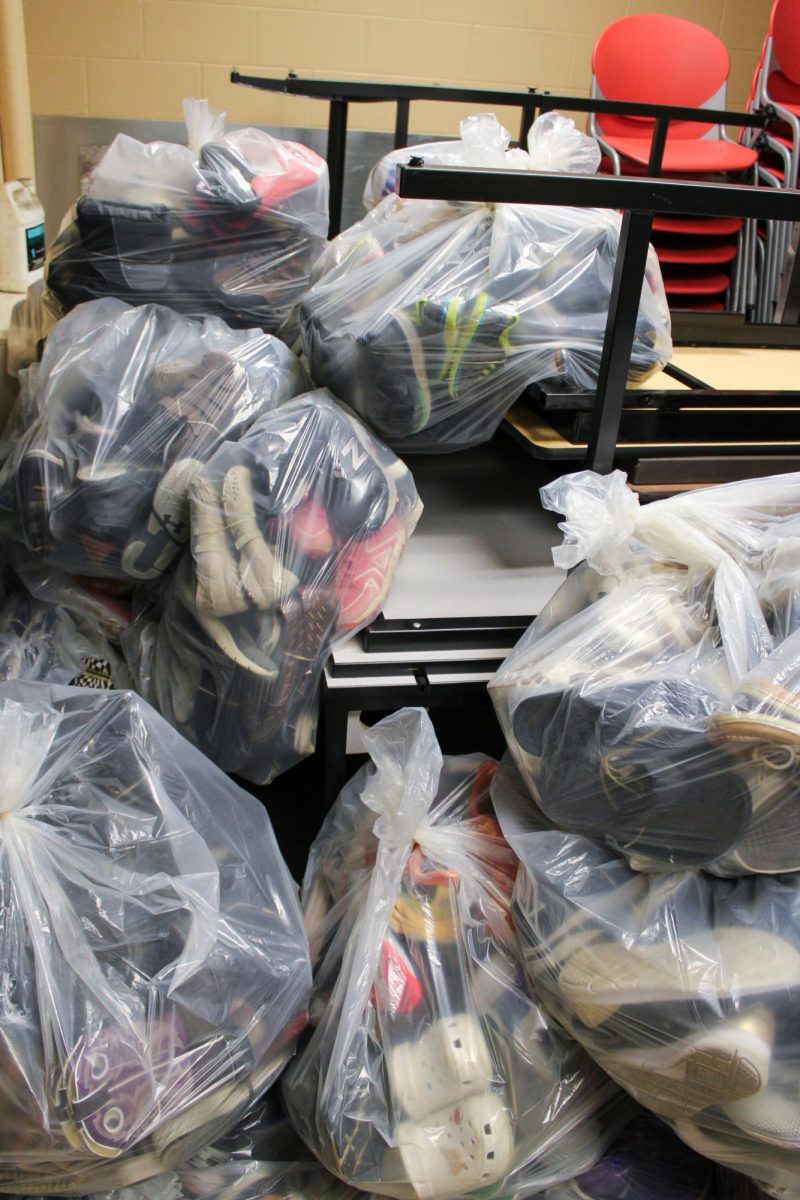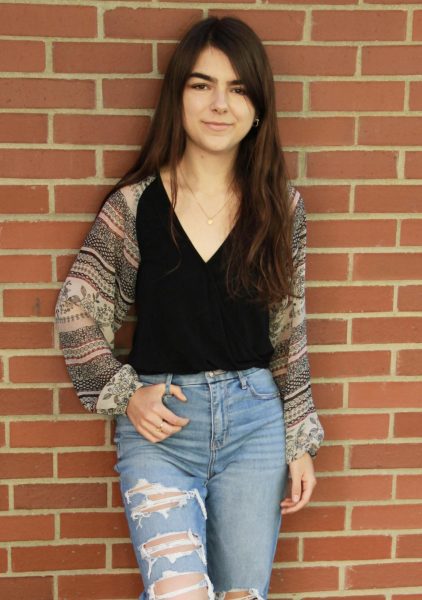Claudia Kinnaird is one of the newest additions to Gibson Southern High School staff, joining halfway through last year’s school year in 2023-2024 as a new Spanish II and Spanish III teacher. When Kinnaird joined Gibson Southern, she was undoubtedly set apart from the rest of the staff and stood out to the students. This was mostly due to her accent and how obvious it was to the Gibson Southern community that she was foreign to Indiana. Her unique attributes were intriguing to others at Gibson Southern, causing many to wonder about her background.
Kinnaird was born in New York City, New York, to a Romanian father named Miguel Gondi and an Italian mother named CloTilde Repetto de Gondi. Her parents were immigrants to Argentina at first, coming from Italy during World War II. They fled Italy during the war when fascism had overtaken the country. After moving to Argentina, her father received a scholarship to attend Cornell University in Ithaca, New York, and her parents immigrated to the United States. Along the way, her parents married. Her father studied hotel management at Cornell. He later developed a career out of his studies, being involved in managing hotels in New York City. Kinnaird and her sister were born as part of this journey while her parents were in the United States.
“Through the years, after [my parents] met in their twenties, they got married, and my dad got a scholarship at Cornell University in Ithaca (New York) to study hotel management,” Kinnaird said. “That’s when my sister and I were born in the United States. He finished his college, and he worked in New York City for a couple of years.”
Kinnaird’s father’s career sent him to many different countries, causing her family to move around throughout most of the early years of her life. Her father’s career eventually landed him back in Argentina, which became the place where Kinnaird lived for the majority of her childhood and teenage years. When she graduated high school, Kinnaird initially studied biochemistry for five years in college in Argentina. She then went to Switzerland to study hotel management after deciding that biochemistry was not the career she wanted to pursue. She went on to work in hotel management for 19 years.
“We ended up back in Argentina for a long time and [my father] ran hotels,” Kinnaird said. “And, my high school years, they were in Argentina. I studied biochemistry for five years, and I did not like it. And, I said, ‘This is not for me,’ and I went back to Switzerland to study hotel management. I worked in hotels for almost 19 years as a director of catering or executive meeting planner. That’s dealing with all meetings.”
Kinnaird’s career in hotel management allowed her to travel to work in different countries, just like her father. However, several years of her work in hotel management were in New York City, New York. She moved to Fairfield, Connecticut, in 1989 and traveled to New York City to work.
“In 1989, I decided to come back to the United States because my cousin lived in Connecticut; Fairfield, Connecticut,” Kinnaird said. “I moved there with them, and I got a job. I got a job at the New York Marriott Marquis [Hotel]. And, my last job was at the UN [Hotel] (Millennium Hilton New York One UN Plaza).”
In 1994 at age 30, after getting married, Kinnaird moved to Mount Vernon, Indiana, her husband’s hometown. She and her husband had two daughters, Nicole and Clara, but divorced in 2003. Kinnaird remarried soon after and has been married for 21 years with her second husband.
“We’re a blended family, and we [have] respect,” Kinnaird said. “I never talked bad about the father, and their father never talked bad about me. That’s very rare.”
Having abandoned her career in hotel management when moving to Indiana, Kinnaird remained conflicted in deciding her new career direction. After beginning to tutor young kids in Spanish, Kinnaird decided to pursue a career in teaching Spanish, obtaining her license in 1998 and becoming a teacher in 2002.
“You know, [even with] all my background, I couldn’t do anything,” Kinnaird said. “I started to help kids with Spanish, tutoring in Spanish. And, I liked it, and I said, ‘Well, maybe I should do that.’”
Kinnaird taught at Evansville Signature School in Evansville, Indiana, for five years before moving to North High School in Evansville, Indiana, in 2006. She taught at North High School for 17 years before she moved to Gibson Southern.
“This job [at Gibson Southern] came open, and I said, ‘Well, why not? Why not make a change?’” Kinnaird said. “You know, I’m 62 years old, but why not? And, I love it. I love it here.”
Kinnaird harbors much admiration for her parents due to the obstacles they persevered through in fleeing from war and the important lessons that they raised her to understand. Even if she felt that they were strict with her at times, she always knew her parents worked very hard for her and her sister and held much respect for them. The most substantial lesson she learned from her parents was not to be afraid to pursue any dreams she had.
“Oh, [my parents were] very strict,” Kinnaird said. “Like, if I was complaining about the teacher, the teacher was always right. Very strict but not mean, because we had our freedom. Like, always, ‘I teach them with the chancleta,’ with the flip flop. I admire them because they left their country with nothing, and they always worked very hard. That’s what I admire, because my dad wrote a letter to Cornell University, and I don’t know if you know, but it’s very hard to get in. Well, he was a very smart man. He did it. My mom was working as a cosmetologist, you know, and doing everything that she could do to help him. They were not afraid to do anything. And, they start to see and get better, better and better financially.”
Spending much of her life in the United States and Argentina, Kinnaird understands some distinct differences between living in either of the two countries. The differences that stand out to her most are the general lifestyle between the two cultures, the safety concerns and the schooling.
“In Argentina, you can go to the park,” Kinnaird said. “You know, we used to cross and play in the park without my mom, and there was not any problem. But, here, we couldn’t do it. When I was young, my mom had to go to the park with me because they were afraid. But, growing up, the difference was the food, the lifestyle. Like, you know, we are louder. We are very loud. And, we eat late and, you know, we take a lot of [public] transportation. We don’t use cars. We use a lot of trains and buses. And, the high school is very different and still is today. The kids do not move from the classes. For example, my Spanish class is your class. And, I move. The teachers move, the teachers travel. And, it’s only for four hours and very strict. It’s not like here. If you know any students that come from overseas, they tell you high school here is so easy because it is easy. You know, it’s nothing bad. It’s different cultures.”
In her childhood and in her years of working in hotel management, Kinnaird visited many countries and ultimately gained a broader understanding of the world she has traveled. Most of the countries she traveled to for work and others she just visited as a child or adult. Switzerland, in particular, was where she studied hotel management in college.
“Well, I was in Spain, Argentina, France and Switzerland,” Kinnaird said. “I visited Hungary and Poland. I went to Vienna, Austria; Florence, Italy and Germany. A country that I always wanted to go to and I didn’t go to was Greece. I would love to go there. I was in Holland. I visited a lot of places. I always look at the culture, the different cultures that they are. And, I was in Edinburgh in Scotland.”
Kinnaird spent many of her years in hotel management working in New York City, where she enjoyed the hustle and bustle of life. While she would not want to return to the city now as an older woman, she loved experiencing the city at the younger stages of her life.
“Oh, New York is New York,” Kinnaird said. “You love it, or you hate it. And, I loved it at that stage in my life. When you have kids, it’s more difficult. I loved to work there. It was very fast-paced. I used to take the train for an hour and a half, sleep on the train, go to Connecticut, come back, and the next morning do the same. And, I loved it.”
Traveling to so many different places, Kinnaird has seen many different cultures and experienced many different ways of life. Despite all the variety that she has seen, Kinnaird believes the Gibson County area to be the most interesting place that she has experienced, an opinion that may be surprising to some. She believes that the tight farming community is something uncommon in most popular parts of the world.
“The most interesting thing for me, and maybe it’s the age, I don’t know, but it’s driving from my house to here because I never lived on a farm,” Kinnaird said. “I’m driving from, and I’m not making it up, driving from home to here and seeing how the farmers work. I always tell my friends, you know, because they say, ‘Oh, Spain. Oh, you live in Switzerland.’ Yeah, but you don’t see this. You don’t see this. This is … this is fascinating for me because I’ve never seen it. You know, how they farm, how they dress, how they eat. How they … the community, like, the 50-year-old community. Here is fascinating; how people, they respect them. What are those big things that they that they use to pull the corn? Oh, they are machines; huge tractors. They are driving those huge tractors. And, people, they are nice. In a big city, they will be cursing them because it’s a very fast pace. But, that’s something that fascinates me; the community, the tight community.”
Moving around the world a considerably high amount throughout her life gave Kinnaird many enlightening experiences, the main takeaway she has from moving around a lot throughout her life is a sense of an absence of belonging. She wasn’t necessarily born and raised all in the same place like most people. She feels like she doesn’t have a distinct place that she can say is her hometown.
“I don’t feel from anywhere,” Kinnaird said. “Do you understand what I’m saying? It’s like when you grew up here, here, here, here and here, yeah, it’s very pretty. It’s very exciting, but I feel I’m not from here or there. I don’t have a solid place. My sister feels exactly the same.”
Another aspect of traveling to many places around the world and being born to parents of different cultures is speaking many different languages. Kinnaird speaks four languages fluently and knows parts of two other languages.
“Well, I speak English, Spanish, French and Italian,” Kinnaird said. “I did understand, and I say I did because I lost a lot of Hungarian. I don’t speak it that much. I can understand some. I can also understand Romanian.”
Another valuable lesson Kinnaird learned while working in hotel management is having the ability to understand and read people based on their outer appearance.
“I learned to read people,” Kinnaird said. “You know, because I look like, like I’m living in the limbo. But, that teaches you a lot in hotel management. You meet so many people that you, right away, you see people. Like, in the classroom, I play like, ah ah, but I know everybody, what they are doing. And, if they are having a bad day, I can see it in their eyes.”
Her career in teaching, on the other hand, is something that Kinnaird considers extremely important to her. She sees teaching as a rewarding experience.
“For me, it’s the most rewarding thing,” Kinnaird said. “Because I’m still talking with kids [just like] I had in 2003 when I just started teaching. And, I love it, you know? I want to connect with the kids because I think that connecting with the kids is how they learn from you.”
Kinnaird is Catholic and believes that God has given her a purpose in life. Aside from being a mother, teaching is part of what Kinnaird believes her purpose in life consists of. She believes that she ended up in Fort Branch as part of God’s plan for her and that God wanted students at Gibson Southern to understand people of different cultures.
“Why did I come to Fort Branch?” Kinnaird said. “Everybody’s asking me the same after 18 years at North. It’s so that the kids know something different because I’m different in a way.”
In all that Kinnaird has experienced, she has developed a strong belief that people must push through criticism and discrimination in order to not allow others to stop them from achieving their goals. She aspires to teach her young students that they should always believe in themselves.
“Follow your inner child,” Kinnaird said. “And never, never think that you cannot do it. Don’t let anybody put you down. That’s what I always tell my kids in high school. Never let anybody put you down. And, if you get into a fight with your friends, okay, ce la vie! There will come other friends. Believe in yourself, and if you want to become, I don’t know, something, you do it! Because the one up there has a purpose for you. And, if it’s not the way exactly how you want it, it will guide you. That’s my belief.”

